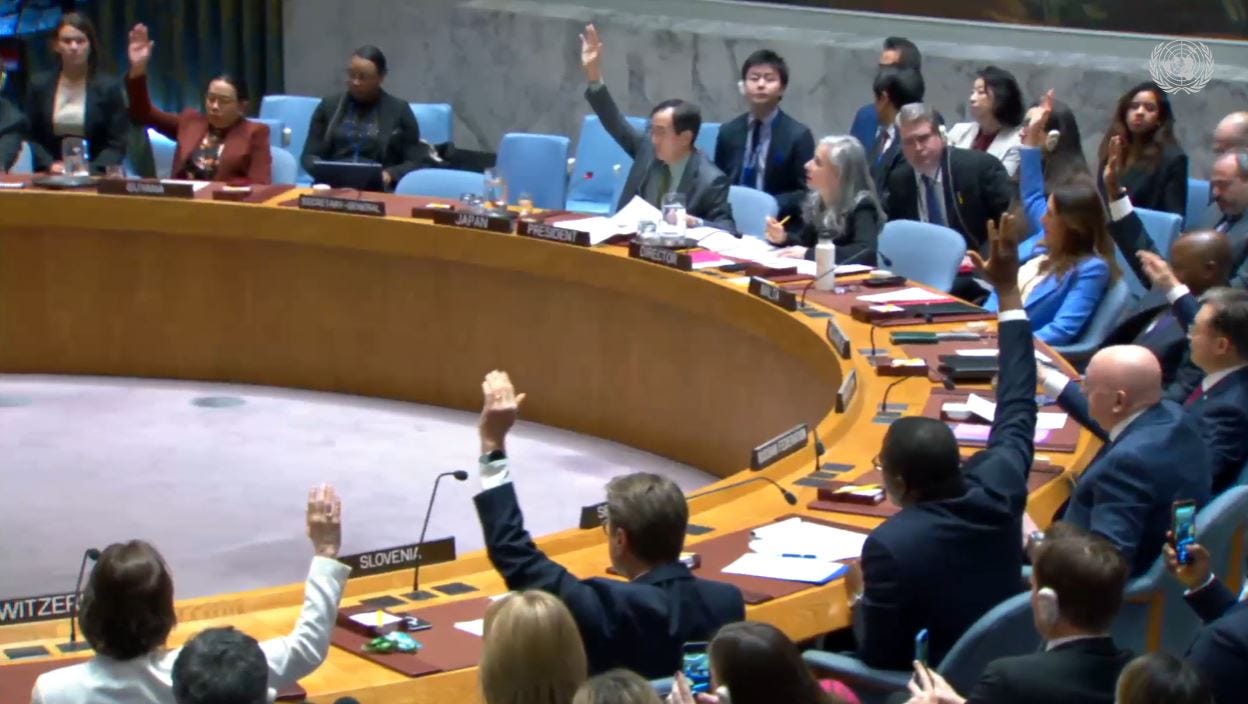
Rapid Reaction: UNSC Passes A Gaza Ceasefire Resolution
While this resolution isn't going to have the impact that the people of Gaza so desperately need, it's still a significant win
As always, welcome to new subscribers and followers, I’m so honored and happy to have you here.
To those of you who have become paid subscribers, my deepest gratitude. I am working to provide more and varied content. But as an independent writer and activist, I can only do this with your help. One easy way to help is to share this newsletter. You can do that by clicking this button:
If you are not yet a subscriber, you can sign up for a free or paid subscription by clicking here:
If you’d like to make a donation for a different amount than a subscription, or if you’d like to support my work without subscribing, you can donate through CashAPP by clicking here:
No matter how you choose to support Cutting Through, I appreciate all of you. Now on to this edition of Cutting Through.
The United Nations Security Council has, at long last, adopted a resolution calling for a ceasefire in Gaza. The vote came on Monday, on a resolution brought by all ten of the non-permanent UNSC members. The United States abstained from the vote, while all other members votes “yes.”
The vote took place only minutes ago, but here is my rapid response to the resolution.
Operatively weak
In terms of what the resolution will actually do on the ground, there is little there. The resolution demands an immediate ceasefire for the month of Ramadan, which ends in a mere two weeks. While the demand is welcome language, it calls for that ceasefire to be “leading to a permanent sustainable ceasefire,” but this is just aspirational language with no binding effect.
It also calls for the unconditional release of hostages held in Gaza. Like the call even for a temporary ceasefire for Israel, that is sure to be unacceptable to and rejected by Hamas. Still, this is a “demand” which is more powerful language. Part of this demand is that medical needs of hostages be fully addressed.
In welcome language, the resolution “demands that the parties comply with their obligations under international law in relation to all persons they detain.” This demand is not limited to “hostages” which only refers to those being held in Gaza by Palestinians. Rather, it refers to all detained persons, which includes the thousands of Palestinians Israel has arrested and jailed, often without charge or due process. Putting those two groups together and on equal footing is a crucial point that should be built on by those working on behalf of Palestinian prisoners and detainees.
The U.S.’ influence is clear enough in the operative clause regarding humanitarian aid, which merely "emphasizes the urgent need to expand the flow of humanitarian assistance to and reinforce the protection of civilians in the entire Gaza Strip and reiterates its demand for the lifting of all barriers to the provision of humanitarian assistance at scale."
There is no reference whatsoever to the countries that are preventing that humanitarian assistance—Israel, primarily, but also the U.S. and other countries that have suspended funding to UNRWA.
Still, the “demand” for lifting barriers to aid is welcome, if redundant.
But there is little prospect of these demands being enacted on the ground. Primarily, that is due to the fact that enforcing UNSC resolutions requires the political will of the UNSC. When getting this weak a resolution is so difficult and controversial, it is hard to see how the will to enforce it can possibly be mustered.
It’s still important
Despite the weakness of the resolution, there is something of real value here. The biggest piece of that is the de-linking of the ceasefire and the release of Israeli hostages. This was a key issue the U.S. fought for, but the non-permanent members would not relent, and the U.S. eventually backed down.
That’s a big deal. First, it’s always important when the big bullies of the UNSC (the U.S. and Russia, primarily) who routinely veto everything they don’t like are made to compromise. But in terms of Gaza, the paradox has been evident for months now. Israel is demanding the release of all the hostages for a short pause before resuming their onslaught on Gaza, which would then proceed with no restraint and no way for the Palestinian side—Hamas or anyone else—to bargain with Israel because they would have nothing left to bargain with. That was obviously not going to work, and was an argument that was primarily used to prolong the Israeli operations.
As Trita Parsi, executive vice president of the Quincy Institute, put it. “This linkage could also make one issue hostage to the other. This is the Israeli position, in which it wants no pressure against its indiscriminate bombing of Gaza until all hostages are released, effectively making the entire population of Gaza hostages. The most immediate consequence of such a linkage is that the war and killing would continue since no issue can be resolved until all issues are resolved.”
Further, there is a principle at stake. The taking of hostages is a crime under international law, and a severe one. It needs to be addressed as such. The call for the hostages to be released unconditionally is the right one, even while, in the real world, there must be negotiations to actually bring that release about.
But it should not be tied beforehand to a ceasefire, nor should the cessation of hostilities that are widely—and in my view, accurately—described as a genocide be tied to the release of hostages. One thing does not justify the other. Each of them should be independent as a matter of principle, even if they must be tied together at the negotiating table. This resolution does that, much to the chagrin of Joe Biden and his administration. They fought against that separation bitterly, but eventually were forced to compromise by the steadfastness of the non-permanent members of the UNSC and the fear of domestic backlash should they veto yet another ceasefire resolution.
Israel’s response
Israel made no pretense about the fact that they expect the United States to function as their agent at the Security Council. In fairness, decades of the U.S. sacrificing not only human rights but its own self-interest to protect Israel’s interests at the Council raised such expectations.
Israel demanded the U.S. veto. In fact, Prime Minister Benjamin Netanyahu threatened to cancel a planned meeting in Washington about the ongoing talks in Doha about Gaza. As soon as the U.S. abstained, Netanyahu carried through on his threat.
It wasn’t much of a threat. Netanyahu was sending two of his top political aides—Tzachi Hanegbi and Ron Dermer—to discuss how Israel planned to conduct its intended attack on Rafah while complying with American demands that such an operation safeguard the lives of Palestinian civilians stuffed into Rafah by Israel’s onslaught in the rest of the Strip.
It is clear to any rational observer that a major attack on Rafah would have a devastating effect on the civilians there, even if one can bring oneself to believe that Israel would abandon the targeting of civilians it has engaged in from the beginning of its war on Gaza and actually tried to avoid civilian casualties. There is nowhere for people to go, and this notion of “humanitarian islands” or “safe zones” has been shown to be a sham throughout these attacks in Gaza.
As to the meeting itself, Hanegbi and Dermer are politicians, not military or intelligence figures. They are salesmen, and could not possibly have spoken credibly to the Americans about military plans. This was about placating a White House that has been forced to reckon with its support for genocide by an angry voter base.
Thus the meeting was not a big deal on the ground, but was just more political theater. But Netanyahu has little else to threaten Biden with in public. With less fanfare, though, he is likely to redouble his efforts to energize pro-Israel forces against Biden ahead of November’s election. Which should be an object lesson for any future Democrat who thinks pandering to Israel is going to benefit them politically.
Conclusion
Overall, this is decidedly a win. The non-permanent members coming together on this resolution makes a statement. All five permanent members had their reasons for staying away from sponsoring this resolution.
The U.S., obviously, only reluctantly allowed it to pass, and continues to strive to cover for Israel as it can, despite finding its ability to do that narrowing due to domestic pressure. Russia and China could not sponsor this resolution because that would give the U.S. all it needed to veto. And France and the UK were not prepared to go up against the U.S. as sponsors of this resolution obviously intended to thwart American intentions at the Council.
It’s a measure of the damage Netanyahu has done to Israel’s standing in the world that all ten non-permanent members could come together on this resolution. The ten members represent a diverse collection of interests and worldviews: Japan, Algeria, Switzerland, Ecuador, Slovenia, Sierra Leone, Guyana, South Korea, Mozambique, and Malta.
Those states didn’t just agree, they worked together closely to get this resolution passed and stood together against American obstructionism, then got the other four permanent members on board and put together enough compromises to get an American abstention.
That could not have happened without the activism and organizing in the U.S. for a ceasefire. And it could not have come about without the world realizing that what Israel is doing in Gaza, whether you want to acknowledge the reality of it being a genocide or not, is unacceptable.
Yes, we’re still stuck with the fact that countries continue to trade with Israel and many even continue to arm Israel, and in the end, those are the things that really matter. But the success of this resolution is a step in the right direction, and if we look over the last 75 years of assault on Palestinian rights, there are all too few of those. And even fewer that are this significant. Take the win.
As always, follow me on:
Twitter @MJPlitnick
Facebook https://www.facebook.com/MitchellPlitnick
Bluesky @mjplitnick.bsky.social
Threads @mjplitnick
Mastodon @MitchellPlitnick@journa.host
for my latest hot takes, comments, and news updates.













